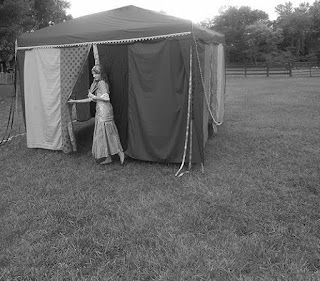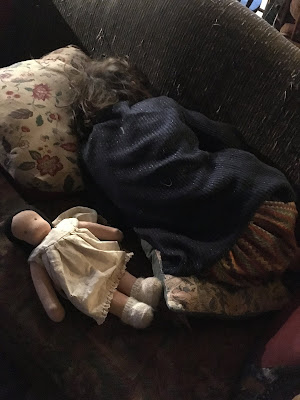Beginning Culture Recovery
Several years ago, I experienced a sharp longing for a more unified life. I was in the throes of welcoming new technology into my home, hoping it would help harness the countless needs of my business and growing family, but instead of the promised simplicity and streamlining, I began to feel my life fragmenting. Every woman wears many hats, but my differing identities began to clash and shatter, and I no longer felt whole. I found the maintenance of a virtual online identity was far more interesting than my non-electronic one, and the real-life self began to wither. Since that real-life self was the one who wrote novels and mothered children and was married to my husband, I grew alarmed. These journals, which I began in 2016 and begin publishing today, are the fruit of my self-diagnosis. Not only was I fragmented, but I discovered our culture was fragmented, and those fragments had begun to polarize at a disturbing clip. I began questioning how I could knit them back together, picturing the exercise as lashing so many barrels from a shattering shipwreck together, like the Swiss Family Robinson. It is our culture which is shattering in the sea, and I am asking myself what can be saved from the wreckage. As a castaway myself, I am not concerned here with grand plans for politics or pop culture or national revival but with the country of my own heart and the landscape of my own mind, and the children the Lord has given me, for we are signs and portents in Israel. This process I have dubbed the Culture Recovery Project, and these Journals are my questing manuals. I hope they prove useful for any other castaways and refugees who find themselves on a similar journey.
Let’s begin with money. No one likes to be told what to do with their money. It cuts at the heart of our human selfishness, and money in a marriage may not be the root of all evil but it is frequently the source of many fights. Money is inescapable in this modern American society where I have lived all my life, and like a permeable gas, it seeps through the crevices of any membrane of piety or apostolic work. Every apostolate must be framed as a business proposal, every cultural endeavor must be squeezed into the box of financial cost, as though that were the most decisive issue. As the Second Vatican Council observed, “many people, especially in economically advanced areas, seem, as it were, to be ruled by economics, so that almost their entire personal and social life is permeated with a certain way of thinking.” (Constitution on the Modern World)
This “economic way of thinking” can build you a house, even a mansion, but it is a house with no doors or windows for escape. No matter how hard you search for a crack away from its material omnipotence, you cannot escape its benevolence, its standards, its evaluation. This is the world we wanted: a comfortable and comforting world, with material relief always within our reach, and we seem to have gotten our wish, but it has turned out to be the wish of Midas. It is us we have made into a golden statue, unable to think or imagine apart from its standard. A world that can be objectified, philosophically or scientifically, can be price-tagged, and the grime and the gum of the price tag has turned out to be the greater annoyance. It can never be fully removed from our thoughts.
But yet Christ calls us, and we who desire to follow Him long to step away from the tax table of our invested concerns, as did the apostle and Gospel-writer Matthew, and follow Him on this tremendous adventure. Is it even possible?
Right now, I live with my husband and assorted children on a homestead at the foot of the Massanutten ridge of western Virginia, and we struggle to make ends meet, having embarked on an artistic apostolic life some twenty-five years ago when we married. There is a bit of Dicken’s Micawber family in us: we are jolly, enjoy being generous, and find the battle to live within our means a constant discipline, with misery lurking behind the next medical or automobile emergency. We will probably always struggle. Yet somewhere along the way, I met Lady Poverty, that great love of St. Francis, and I called out to her. And the peace and freedom that came along with her welcome was unexpected and tantalizing. It is about my friendship with her that I write this first of journals.
Let’s begin with money. No one likes to be told what to do with their money. It cuts at the heart of our human selfishness, and money in a marriage may not be the root of all evil but it is frequently the source of many fights. Money is inescapable in this modern American society where I have lived all my life, and like a permeable gas, it seeps through the crevices of any membrane of piety or apostolic work. Every apostolate must be framed as a business proposal, every cultural endeavor must be squeezed into the box of financial cost, as though that were the most decisive issue. As the Second Vatican Council observed, “many people, especially in economically advanced areas, seem, as it were, to be ruled by economics, so that almost their entire personal and social life is permeated with a certain way of thinking.” (Constitution on the Modern World)
This “economic way of thinking” can build you a house, even a mansion, but it is a house with no doors or windows for escape. No matter how hard you search for a crack away from its material omnipotence, you cannot escape its benevolence, its standards, its evaluation. This is the world we wanted: a comfortable and comforting world, with material relief always within our reach, and we seem to have gotten our wish, but it has turned out to be the wish of Midas. It is us we have made into a golden statue, unable to think or imagine apart from its standard. A world that can be objectified, philosophically or scientifically, can be price-tagged, and the grime and the gum of the price tag has turned out to be the greater annoyance. It can never be fully removed from our thoughts.
But yet Christ calls us, and we who desire to follow Him long to step away from the tax table of our invested concerns, as did the apostle and Gospel-writer Matthew, and follow Him on this tremendous adventure. Is it even possible?
Right now, I live with my husband and assorted children on a homestead at the foot of the Massanutten ridge of western Virginia, and we struggle to make ends meet, having embarked on an artistic apostolic life some twenty-five years ago when we married. There is a bit of Dicken’s Micawber family in us: we are jolly, enjoy being generous, and find the battle to live within our means a constant discipline, with misery lurking behind the next medical or automobile emergency. We will probably always struggle. Yet somewhere along the way, I met Lady Poverty, that great love of St. Francis, and I called out to her. And the peace and freedom that came along with her welcome was unexpected and tantalizing. It is about my friendship with her that I write this first of journals.



Comments